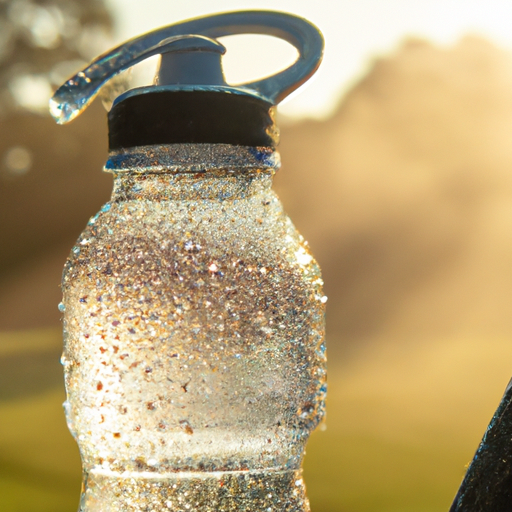In this article, you will learn some simple and effective tips on how to stay hydrated during your workouts. It’s crucial to keep your body hydrated while exercising to ensure optimal performance and prevent dehydration. So, let’s dive in and discover some practical strategies that will help you stay hydrated and maintain your energy levels throughout your workouts.
Firstly, it’s essential to drink water before, during, and after your workouts. Make sure to hydrate yourself adequately before you start exercising, as it sets the tone for the rest of your session. During your workout, take regular water breaks to sip on fluids and replenish the water lost through sweat. Finally, after your workout is over, continue hydrating yourself to replenish the fluids lost during exercise. By following this simple routine, you will ensure that your body stays well-hydrated and ready for any physical challenges during your workouts.

Importance of Hydration During Workouts
Understanding the Significance of Hydration
Hydration is an essential aspect of any workout routine. Proper hydration ensures that your body is functioning optimally, allowing you to perform at your best and avoid potential health risks. During exercise, your body loses water through sweat, and if you don’t replenish it adequately, it can lead to dehydration. This can negatively impact your performance, increase the risk of cramps, dizziness, and even heat stroke. Therefore, understanding the significance of hydration is crucial for your overall well-being.
Effects of Dehydration on Performance
Dehydration can significantly affect your workout performance and limit your potential gains. When you’re dehydrated, your body’s ability to regulate temperature is compromised, leading to increased fatigue and a decrease in endurance. Lack of fluids also impairs your muscles’ ability to contract efficiently, resulting in reduced strength and power output. Furthermore, dehydration can cause a decline in cognitive function, making it harder to focus and maintain proper form during exercise. By not staying properly hydrated, you are setting yourself up for subpar workouts and potential injuries.
Benefits of Proper Hydration during Workouts
On the other hand, staying properly hydrated during workouts carries numerous benefits that can enhance your performance and overall fitness journey. Adequate hydration helps maintain proper blood volume, allowing your heart to pump oxygen and nutrients to your muscles more efficiently. This means you’ll have more energy and endurance to push through intense workouts. Additionally, proper hydration helps regulate body temperature, preventing overheating and reducing the risk of heat-related illnesses. It also promotes joint lubrication, reducing the chances of joint pain and injuries. Therefore, making hydration a priority during your workouts is essential for optimizing your performance and achieving your fitness goals.
Hydration Tips Before Workouts
Pre-Workout Hydration Strategies
Start hydrating well before your workout. Aim to drink at least 16-20 ounces of water 2-3 hours before exercising, and an additional 8-10 ounces 20-30 minutes before starting your workout. This gives your body enough time to absorb the fluids and ensures optimal hydration levels during your exercise session.
How Much Water to Drink Before a Workout
The amount of water you should drink before a workout varies depending on factors such as your weight, workout intensity, and the duration of your session. As a general guideline, aim to consume half an ounce to one ounce of water per pound of body weight at least 4 hours before exercise. Adjust this amount according to your individual needs and preferences.
Ideal Timing for Hydration
Timing your hydration is crucial to ensure that your body has enough time to absorb the fluids and use them effectively during your workout. Remember to drink water consistently throughout the day leading up to your workout, rather than chugging a large amount right before exercising. This helps maintain a steady level of hydration and reduces the risk of feeling bloated or uncomfortable during your workout.
Hydration Tips During Workouts
Drink Water Regularly
During your workout, it is important to drink water at regular intervals to replace the fluids lost through sweating. The exact amount will depend on various factors such as exercise intensity, duration, and individual sweat rate. As a general guideline, aim to drink 7-10 ounces of water every 10-20 minutes during your workout. Adjust this amount based on your personal hydration needs and comfort level.
Choosing the Right Sports Drinks
For high-intensity workouts lasting longer than an hour or in hot and humid environments, sports drinks can be beneficial. These beverages contain electrolytes like sodium and potassium, which help replenish lost minerals and maintain better fluid balance in the body. However, for shorter workouts or low-intensity activities, water is usually sufficient to keep you hydrated.
Incorporating Electrolytes
Electrolytes play a crucial role in maintaining proper hydration levels and supporting muscle function. They help regulate fluid balance, assist in nerve and muscle function, and contribute to the absorption and distribution of nutrients. If you choose to consume sports drinks or electrolyte-enhanced beverages, ensure they contain adequate amounts of electrolytes to replenish what you’ve lost through sweating.
Hydration Breaks and Guidelines
Taking short breaks during your workout to hydrate can help prevent dehydration and optimize your performance. Don’t wait until you feel thirsty to drink water as thirst is not always an accurate indicator of your fluid needs. Set a timer or schedule specific breaks to remind yourself to drink water regularly. Additionally, pay attention to your body’s signals and adjust your hydration routine based on factors such as sweat rate, weather conditions, and exercise intensity.

Hydration Tips After Workouts
Replenishing Fluids and Electrolytes
After your workout, it is crucial to replenish the fluids and electrolytes lost during exercise. Aim to drink 16-24 ounces of water for every pound lost during your workout. You can also incorporate foods and beverages that contain high water content and natural electrolytes, such as coconut water, fruits, and vegetables.
Post-Workout Hydration Routine
Creating a post-workout hydration routine can help ensure that you recover properly and set yourself up for future workouts. Make it a habit to drink water or a recovery beverage within 30 minutes of finishing your workout. This helps kickstart the recovery process, replenish glycogen stores, and repair muscle tissue.
Importance of Proper Recovery
Proper hydration after a workout is crucial for effective recovery. When you don’t adequately hydrate, your body is unable to repair damaged tissues and replenish the energy stores efficiently. This can lead to muscle soreness, fatigue, and an increased risk of injury. By prioritizing post-workout hydration, you provide your body with the necessary tools to recover and adapt to the stress placed on your muscles during exercise.
Effects of Different Intensity Workouts on Hydration
Understanding Water Loss during High-Intensity Workouts
High-intensity workouts, such as interval training or HIIT (high-intensity interval training), often result in significant water loss due to increased sweat rates. This can lead to faster dehydration if you don’t replace the fluids adequately. It’s crucial to pay attention to your body’s fluid needs during these workouts and hydrate accordingly.
Hydration Strategies for Endurance Training
Endurance training, such as long-distance running or cycling, requires careful attention to hydration. Since these workouts usually last for an extended period, it’s important to consume fluids regularly. Plan your hydration strategy beforehand, and consider carrying a water bottle or using hydration packs or belts to ensure constant access to fluids.
Hydration Considerations for Strength Training
While strength training may not cause significant water loss compared to cardio exercises, it’s still important to hydrate properly. Muscles rely on water for proper function, and staying hydrated can contribute to better performance and muscle recovery. Aim to drink water between sets and keep a water bottle nearby during your strength training sessions.
Common Hydration Mistakes to Avoid
Overhydration vs Underhydration
Finding the right balance is key when it comes to hydration. Both overhydration and underhydration can negatively impact your workout performance and overall health. Overhydration, also known as water intoxication, can cause a dangerous electrolyte imbalance in the body. On the other hand, underhydration can lead to dehydration and the associated adverse effects. Listen to your body, monitor urine color, and adjust your fluid intake accordingly.
Risks of Ignoring Hydration
Ignoring hydration can have several risks, ranging from mild discomfort to severe health complications. Dehydration can lead to symptoms such as dizziness, fatigue, muscle cramps, and headaches. In extreme cases, it can result in heatstroke, kidney problems, and even death. Ignoring hydration is not worth compromising your health and performance, so prioritize proper fluid intake before, during, and after your workouts.
Hydration Myths Debunked
There are several myths surrounding hydration that need to be debunked. One common myth is that drinking excessive amounts of water will automatically enhance performance. While staying hydrated is crucial, excessive water consumption without proper electrolyte balance can be harmful. Another myth is that thirst is a reliable indicator of hydration status. Thirst can lag behind actual fluid needs, so it’s important to drink water regularly even if you don’t feel thirsty.
Signs of Dehydration During Workouts
Recognizing Early Symptoms of Dehydration
It’s important to recognize the early signs of dehydration to address the issue promptly. Common symptoms include increased thirst, dry mouth, fatigue, decreased urine output, dark-colored urine, dizziness, and muscle cramps. Paying attention to these signs can help you take the necessary steps to stay properly hydrated during your workouts.
Effects on Performance and Health
Dehydration can significantly impact your workout performance and overall health. As mentioned earlier, it can lead to increased fatigue, reduced endurance, impaired muscle function, decreased cognitive ability, and an increased risk of injuries. Staying hydrated is crucial for maintaining optimal performance levels and safeguarding your health during workouts.
Monitoring Hydration Levels
Monitoring your hydration levels can help you stay on top of your fluid intake. One effective way to monitor hydration is by examining your urine color. Clear or pale urine usually indicates proper hydration, while dark-colored urine suggests dehydration. Another method is to weigh yourself before and after exercise. For every pound lost during your workout, aim to drink 16-24 ounces of water to replenish your fluid levels.
Factors Affecting Hydration Needs
Temperature and Humidity
Weather conditions, especially high temperatures and humidity, can significantly increase your hydration needs. Sweating is the body’s natural cooling mechanism, but it also leads to fluid loss. In hot and humid environments, you may need to increase your fluid intake to compensate for the increased sweat rate.
Individual Sweat Rates
Sweat rates can vary significantly among individuals. Some people naturally sweat more than others, leading to higher fluid loss during workouts. Pay attention to your sweat rate and adjust your fluid intake accordingly. This can help ensure that you stay properly hydrated and maintain optimal performance levels during your workouts.
Body Size and Composition
Your body size and composition can also affect your hydration needs. Larger individuals typically have a higher water content in their bodies and may need to consume more fluids to stay properly hydrated. Additionally, individuals with higher muscle mass may have a higher metabolic rate and sweat more, requiring increased fluid intake.
Additional Tips for Optimal Hydration
Monitoring Urine Color
As mentioned earlier, monitoring urine color can be a reliable indicator of your hydration status. Strive for pale yellow or clear urine, as this suggests proper hydration. Dark-colored urine is a sign that you need to drink more water to maintain optimal fluid balance.
Hydrating with Fruits and Vegetables
Incorporating fruits and vegetables with high water content into your diet can further support your hydration efforts. Watermelon, cucumber, oranges, grapefruit, and strawberries are some examples of hydrating foods that can contribute to your overall fluid intake.
Limiting Caffeine and Alcohol Intake
While caffeine and alcohol are enjoyable beverages, they can have diuretic effects and increase fluid loss. If you consume these beverages, it’s important to balance them with additional water intake to maintain proper hydration levels.
Creating a Hydration Routine
Establishing a hydration routine can help you stay consistent with your fluid intake. Set reminders to drink water at specific times during the day, such as before meals or after you wake up. Keep a water bottle with you at all times to make hydration convenient and easily accessible.
Conclusion
Prioritizing Hydration in Workouts
Staying properly hydrated before, during, and after your workouts is crucial for optimal performance and overall well-being. By prioritizing hydration, you can maximize your exercise potential, reduce the risk of injury, and enhance your recovery.
Benefits of Consistent Hydration
Consistent hydration brings numerous benefits to your workouts and overall health. It helps regulate body temperature, supports muscle function, improves cognitive function, increases endurance, and reduces the risk of heat-related illnesses.
Takeaway Recommendations
To stay hydrated during your workouts, start by implementing pre-workout hydration strategies such as drinking water 2-3 hours before exercising. During your workout, drink water regularly or consider using sports drinks for high-intensity or long-duration activities. After your workout, replenish lost fluids and electrolytes through water and hydrating foods. Avoid common hydration mistakes, monitor your hydration levels, and consider individual factors affecting your hydration needs. Stay consistent with your hydration routine and prioritize your fluid intake to optimize your workouts and achieve your fitness goals.
